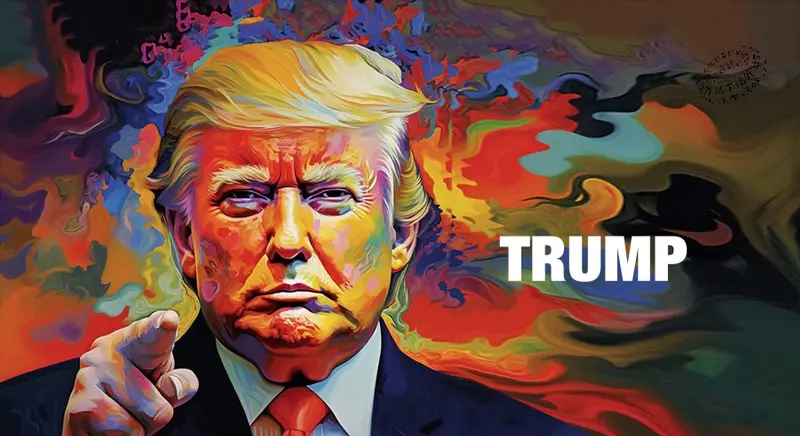What positive actions has Trump taken for the crypto community since taking office?
Author: Grapefruit, ChainCatcher
Donald Trump is undoubtedly the most attention-grabbing president. On the eve of his inauguration, the cryptocurrency named TRUMP, issued by Trump, reached a market value of nearly $100 billion within just two days, igniting nationwide excitement and generating significant traffic and attention in the crypto space.
On his first day in office, the multiple executive orders he signed attracted widespread attention from the crypto market, validating his campaign promises to the crypto community.
As of January 22, what positive actions for cryptocurrency did Trump release on his first day in office?
- Dismissal of SEC Chairman Gary Gensler and appointment of crypto-friendly Uyeda as acting SEC chairman, seen as a turning point for cryptocurrency regulation;
- The efficiency department DOGE, led by Musk, was approved, and the official website changed its logo to a Dogecoin avatar, causing a short-term surge of over 15% for DOGE;
- SoftBank, OpenAI, and Oracle invested $500 billion to support the infrastructure for AI development in the U.S., driving a collective rise in crypto AI sector assets;
- A pardon for Ross Ulbricht, the founder of Silk Road, who was sentenced to life plus 40 years, sparking tributes to the libertarian ideals advocated by Bitcoin;
1. SEC Acting Chairman Uyeda Takes Office, Establishes Special Working Group for Cryptocurrency Regulation Framework
On January 21, the White House announced the new appointment: current SEC Commissioner Mark Uyeda has been officially appointed as the acting SEC chairman, temporarily leading the agency's work until the new SEC chairman is formally in place. Former SEC Chairman Gary Gensler resigned on the day Trump was inaugurated.
As early as December 5, 2024, Trump publicly stated that he had selected former SEC Commissioner Paul Atkins to serve as the official chairman of the SEC. However, this appointment must await Senate approval, which can take several months.
Uyeda is a Republican and has worked at the SEC for 15 years, serving as a commissioner since June 30, 2022. He has consistently held a friendly attitude towards cryptocurrencies and cast a crucial vote in favor of last year's Bitcoin spot ETF approval.
In an interview with FOX Business last October, Uyeda stated that he would help Trump fulfill his promise to end the Biden administration's so-called "war on cryptocurrency." Trump is delivering on his commitments to the cryptocurrency community made during his campaign.
On his first day in office, Uyeda announced the establishment of a special working group for cryptocurrencies, led by current SEC Commissioner Hester Peirce, dedicated to formulating a comprehensive and clear regulatory framework for cryptocurrency assets.
Hester Peirce is known as a defender of cryptocurrency and blockchain technology, earning her the title of Crypto Mom. She and Uyeda have frequently united to oppose several legal actions initiated by former SEC Chairman Gensler against crypto companies.
Trump's nominated SEC chairman Paul Atkins was previously a subordinate of Peirce and Uyeda. Although he has made relatively few public statements regarding cryptocurrencies, he advocates for a less restrictive regulatory framework for emerging technologies such as cryptocurrencies and blockchain. Given his past work experience and potential attitudes, Atkins is likely to support cryptocurrencies.
Therefore, the cryptocurrency regulatory framework rules led by the working group under Uyeda are expected to reverse the harsh crackdown on cryptocurrencies by former SEC Chairman Gary Gensler and may likely result in more favorable policies for the development of the crypto industry.
On January 24, the SEC will hold its first closed-door meeting since Uyeda took over as acting chairman, which will include discussions on initiating and resolving injunction actions.
2. Musk's D.O.G.E Website Features Dogecoin Logo, Driving DOGE's Short-Term Surge of Over 15%
On January 22, Trump signed an executive order announcing the establishment of the "Department Of Government Efficiency" (D.O.G.E), led by Elon Musk. Because the department's name is the same as Dogecoin, which Musk has publicly supported multiple times, it attracted attention from the crypto market from the outset, with each action from the department triggering short-term movements in Dogecoin.
On the evening of January 21, the D.O.G.E official website displayed a logo featuring the Dogecoin avatar, quickly capturing the attention of the crypto community and causing a short-term surge of over 15% for the DOGE token, which has since fallen back to $0.36.
This morning, the D.O.G.E official website changed its logo, no longer using the Dogecoin emblem, but instead featuring a different dog while still retaining elements of the Shiba Inu.
As of the time of publication, the D.O.G.E official website no longer displays any related logos.
Additionally, early this morning, Musk stated in a public speech that he would take Dogecoin to Mars, but the market did not react.
3. SoftBank and Two Other Companies Invest $500 Billion in U.S. AI, Driving Collective Rise in Crypto AI Sector Assets
At Trump's inauguration event, Masayoshi Son of SoftBank announced that they would join OpenAI and Oracle in investing $500 billion to support the infrastructure for AI development in the U.S.
Trump stated that these three companies have teamed up to create a project called "Interstellar Gateway," planning to build data centers in the U.S. to support AI development, marking the "largest" AI infrastructure investment project in history.
Analysts say, this could usher in a wave of large-scale AI investment in the U.S. Over the next three years, there may be $2 trillion in AI-related capital expenditures to meet the needs of businesses and consumers. More software companies may join the AI camp, with enterprise consumption potentially starting in 2025.
"AI and cryptocurrency" are seen as two major areas of focus for Trump after taking office. Following this news, assets in the crypto AI sector collectively rose, with AI16Z, GRIFFAIN, VIRTUAL, and other AI sector concept tokens seeing increases of over 30% within 24 hours.
4. Ross Ulbricht, Founder of Silk Road Sentenced to Life Plus 40 Years, Granted Pardon
On January 22, Ross Ulbricht, the founder of the dark web Silk Road, who has served 11 years of his sentence, was released from prison. This morning, Trump announced that he had signed a pardon for Ross Ulbricht. That afternoon, Bitcoin Magazine released a photo of Ross Ulbricht's release.

Founded in 2011, Silk Road was a notorious online black market platform that allowed users to anonymously buy and sell various goods using Bitcoin and other cryptocurrencies, marking the first concrete application of Bitcoin as a payment tool. Therefore, founder Ross is regarded as an extremely important figure in the history of Bitcoin's development.
In 2013, Silk Road was shut down by the FBI, and founder Ross was arrested and charged with multiple offenses, including money laundering and conspiracy to sell drugs, ultimately being sentenced to life in prison plus 40 years without the possibility of parole.
For the cryptocurrency world, Ross Ulbricht represents the early idealism of Bitcoin: decentralization, freedom, and a trustless system. During Ross's 11 years in prison, many in the crypto industry viewed his imprisonment as a blow to the vision of internet sovereignty, and various organizations have been advocating for his clemency, believing he deserves a second chance. More than 600,000 people signed petitions for Ross's release, including Trump and Ethereum founder Vitalik Buterin.
To rescue Ross, the crypto community even spontaneously organized the FreeRossDAO. It is worth noting that the FreeRossDAO is now suspended.
During his 2024 campaign speeches and at the Bitcoin 2024 conference, Trump promised that if elected, he would reduce Ross Ulbricht's sentence. In discussions on PolyMarket about "Who will Trump pardon within 100 days of taking office?", Ross's probability of being pardoned remained above 70% for a long time.
Today, Ross was released not only as a fulfillment of Trump's promise to the crypto community but also as a support for the libertarian ideals represented by Bitcoin.










